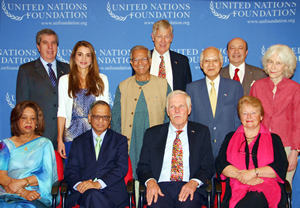 As we prepare to return from India and the semi-annual UN Foundation Board meeting, I am struck by one of the themes that emerged from discussions this past week: the need for long-term investments in humanity. This is more than just a lofty phrase. It is a call for a fundamental shift in the way people think about philanthropy, partnership, and working with the United Nations.
As we prepare to return from India and the semi-annual UN Foundation Board meeting, I am struck by one of the themes that emerged from discussions this past week: the need for long-term investments in humanity. This is more than just a lofty phrase. It is a call for a fundamental shift in the way people think about philanthropy, partnership, and working with the United Nations.
When Ted Turner founded the UN Foundation fourteen years ago, he made it clear that he was making a long-term investment in something broader than just one project, place, or one group of people. He was investing in the UN as one of the best ways to get to the root problems of some of the biggest global problems of our time. His donation wasn’t just a milestone in generosity; it was a statement about wanting to get the best value for money on his $1 billion investment. Since the UN works on the big global issues – women and children’s health, a new energy future, a secure world and strong U.S.-UN relations to name just a few – his example continues to inspire thousands of philanthropists big and small to invest in ways that can make a difference for millions.
India is an example of how these long-term investments produce tangible, measurable results. In India we saw concrete examples of how access to energy, better education and health, and innovation in technology are transforming the country. There are now parts of the country that are using solar energy. One of Delhi’s major satellite cities has successfully transmitted electricity to over 1.5 million people. Millions of children now get a nutritious meal every day. And the UN’s work is critical to making sure progress like this is possible. Everyone we met in India made it clear that these results are just the beginning, and emphasized that just as much remains to be done.
This is why we support the global work of the UN. Whether we live in India or in Indiana, we should all be focused on long-term solutions to poverty around the world. You are investing in humanity when you support the UN Foundation through advocacy, ideas, or your donations. As our Board reiterated this week, these are investments we all can believe in.



 View All Blog Posts
View All Blog Posts